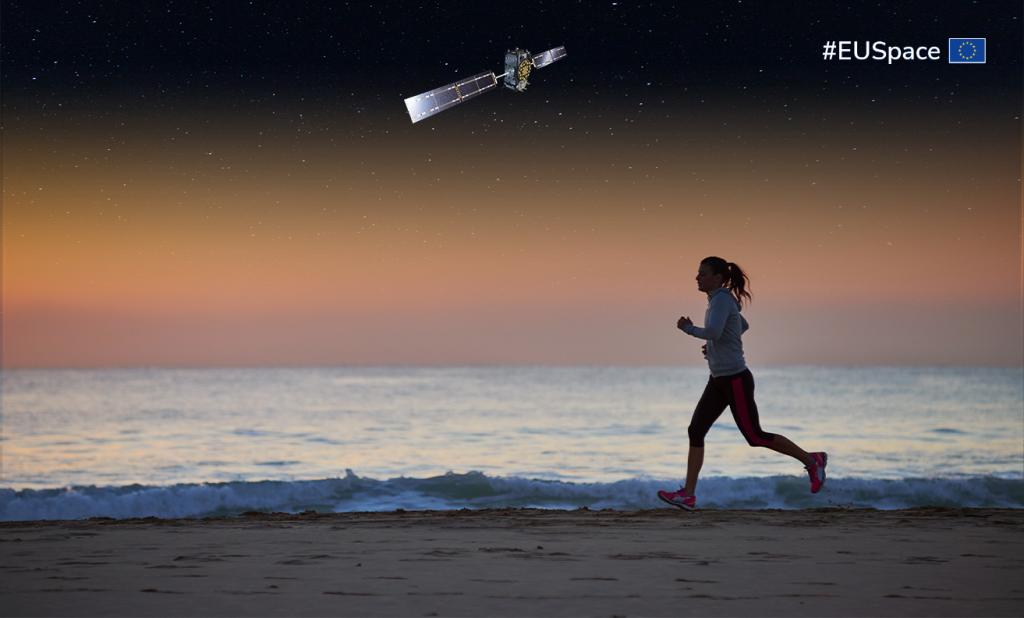Let EU Space put a smile on your face!

In a time when the news seems to only go from bad to worse, we could all benefit from a little space. No, not physical space but the type of space that can bring a bit of joy into our lives.
That’s right. We’re talking about EU Space!
In celebration of International Day of Happiness, here are five ways EU Space can put a smile on your face.
A relaxing day at the beach
Sun, sand and sea – these are the keys to a perfect day at the beach. Jellyfish on the other hand… not so fun.
But with Earth Observation, you can be sure to enjoy a sting-free beach day.
That’s because data from the Copernicus Marine Service can be used to monitor jellyfish swarms and provide real-time updates on the risk at a particular location. If the risk is high, you can stay out of the water or maybe pick another beach.
If you do choose to stay on the sand, Earth Observation data can help keep you from looking like a lobster. By measuring UV radiation, ozone levels, cloud cover, time of day and geographic location, Copernicus calculates your risk of getting sunburned (although we still recommend using sunscreen).
A relaxing night in
After a long day of work, sometimes all you want to do is come home, kick up your feet, turn on the television and simply chill. But just as you’re about to enter ‘relaxation mode’, your stomach starts to rumble.
Ah! There’s no food in the house. And even if there was, the last thing you feel like doing is cooking a meal.
Then you remember – you don’t have to. Still sitting on the sofa, you simply pull out your smartphone, open a food delivery app and place your order. Then it’s back to relaxing as EU Space takes care of the rest.
First, your app uses GNSS data to determine what restaurants are available in your area. Once your food is ready, the carrier then uses GNSS positioning and navigation to pick up your order and deliver it right to your door. Thanks to its highly accurate time signals, GNSS even plays a role in keeping your online payment safe and secure.
Why stop there?
Thanks to the increasing convergence of space technology, the Internet of Things and so-called ‘super apps’, you will soon be able to do even more from the comfort of your own home – from managing bills to visiting the doctor.
So go ahead and relax – you deserve it!
Enjoying the great outdoors safely
Spending even just a little time outdoors can have a big impact on your mental and physical well-being. Whether you’re a runner, walker, hiker or biker, EU Space helps ensure you can enjoy being outside safely.
For example, the Copernicus Demonstrator uses satellite and ground-based data to monitor atmospheric composition and provide daily forecasts and analyses on air pollution and smoke emissions. You can use this information to decide what time of day to exercise and to protect yourself from developing potential respiratory issues.
GNSS, Earth Observation and SATCOM – a space-based triathlon to Olympic glory
Once you are outside, your smartwatch leverages GNSS positioning to measure your steps, speed and stamina. And if you happen to take a wrong turn, Galileo’s improved accuracy will get you back on track even if exercising in an ‘urban canyon’ or hiking in a remote woods.
Space can also help people with disabilities get outside. For example, apps such as BlindSquare and Lazarillo Accessible GPS rely on GNSS functionalities to help people with vision impairment safely and autonomously navigate city streets.
Sustainably scratching the travel itch
Space data and services has revolutionised travel, making it both safer and more enjoyable. For instance, thanks to GNSS positioning, using smartphones to find our way through a new city has become second nature, while Earth Observation data is behind the weather forecasting travellers use to decide whether to explore outside or make it a museum day.
We can also easily explore cities like Barcelona via their e-bike sharing programme, which uses the highly accurate positioning that Galileo provides to help you navigate from docking station to destination.
Did you know that EU Space is working to make travel more inclusive? For instance, there are now several apps that use GNSS-based location information to help people travelling in unfamiliar places to find LGBTQ+ friendly spaces.
But space isn’t just making travel more enjoyable, it’s also making it more sustainable. According to the EUSPA EO and GNSS Market Report, several apps are integrating Earth Observation and GNSS to help the tourism sector go green. These mobile apps are designed to give travellers information on their environmental footprint and help them make more sustainable travel choices.
Happiness is a warm puppy!
The creator of ‘Peanuts’ may have said that ‘happiness is a warm puppy’, but it’s EU space that helps keep Snoopy happy at home.
There is now a plethora of devices available that use space data and positioning to track a dog’s location. You can also set up virtual fences and receive alerts when a pet leaves a designated area. Some devices even let you track your pooch’s activity, sleep, barking and health.
A dog’s happiness is a simple thing – a belly rub, a walk in the park and a loving companion.
So, this International Day of Happiness, let’s learn from our four-legged friends and take time to enjoy the simple things in life.
With EU Space, doing so is easier than ever!
Media note: This feature can be republished without charge provided the European Union Agency for the Space Programme (EUSPA) is acknowledged as the source at the top or the bottom of the story. You must request permission before you use any of the photographs on the site. If you republish, we would be grateful if you could link back to the EUSPA website.